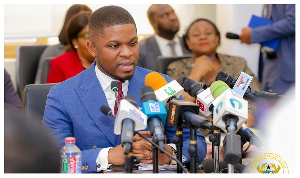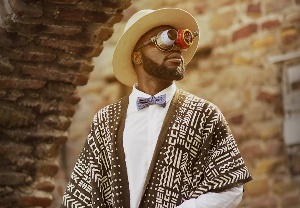A Historical Context
‘When the white man came, he had his bible and we had our land. He asked us to close our eyes and pray with him. When we opened our eyes, we had the bible and he had our land’- Kenyan saying
To understand certain aspects of the Ghanaian mentality (which cannot be wholly divorced from the wider African mindset), it may be useful to look over our shoulders into the mists of the past.
Before the arrival of the Europeans in the late 15th century, present-day Ghana consisted of several nation states. Of course, it can hardly be said that these states lived peacefully with each other all the time. There were wars and conquests and treaties among the various powers, which in my view are all part of the inevitable if painful pangs of nation building-a sort of shifting tectonic plates that find their own level with time. It is argued that had this continued without European interference, our continent would have evolved, as a matter of course, in a nature and manner suitable to our changing needs and the realities of the day, as she had been for centuries before their arrival.
Walter Rodney, the late Guyanese political scientist, powerfully and convincingly develops this point in his book ‘How Europe Underdeveloped Africa’. He argues that by interfering with African systems and institutions, and in some cases substituting them with European ones, the Europeans were sowing the seeds of disaster on the continent, even if taken at its highest point, they genuinely believed they were being helpful. The result of the European intervention is that Ghana, and Africa in general, now has a dual heritage- our traditional systems and beliefs that were reduced to a stump by the Europeans on the one hand, and on the other, the western system of government and its allied institutions that were imposed and which remain alien and confusing to the bulk of our populations. In my view, this confusion creates a dangerous vacuum that allows our political leadership to manipulate most of our electorate, who happen to be uneducated. A feature of this vacuum, in my opinion, is the lack of a highly sophisticated electorate to keep our governments in check. In the past, the army, aware that it could count on a largely unsophisticated electorate for blind support, have launched coup after coup, with debilitating consequences. At independence we simply inherited foreign political systems and institutions that were not understood or appreciated by most of our electorate for their lack of relevance to our needs.
I believe that the European trinity of slavery, colonisation and Christianity proved to be a powerful tool in shaping the way we thought and still think today. Essentially, the European adventure in these three areas stripped the African of his belief systems and his identity. He was taught that his way of life- his religion, his culture, his language, his skin colour, his very essence- was wrong and inferior to the European model. The Europeans knew that the most effective way of controlling a person was to control his mind. No wonder Bob Marley enjoins us, in ‘Redemption Song’ to emancipate ourselves from ‘mental slavery’-it is the worst kind. Broadly speaking, in spite of the various notable wars in Africa between the colonialists and native societies that resisted European control, the Europeans did not have (or need) vast armies to control us. Just consider the fact that Britain, which at a point ruled about a quarter of the world, can fit into Nigeria, one of its former colonies, so many times. In the vast majority of cases, education and Christianity softened the ground for control. Of course, they elevated those who did convert to the ways of the European. It was these converts who got the clerical, similar non-menial jobs in the colonial administration and the benefits that came with it, as portrayed by the English author Joyce Cary in his 1939 book ‘Mister Johnson’. These elevated Africans remind one of the ‘ house negros’ on the American slave plantations. These were the slaves who by dint of their loyalty and subservience to the white man, were ‘promoted’ from the fields to work in their masters’ house as maids, cooks, stewards and the like, and who generally saw themselves as above the plantation workers in the pecking order of things. The extent and effect of the degradation of proud African institutions by the colonialists is powerfully portrayed in Chinua Achebe’s masterpiece, Things Fall Apart, which is said to have been inspired by what he saw as Joyce Cary’s insipid, and patronising portrayal of the African in his novel.
The direct result of the trinity that I have referred to above manifests itself in our modern day mindset in many ways. Speaking ‘vernacular’ (i.e. your own native language) whilst I was in primary school in Ghana was a serious offence and was certainly punishable. Many admire our men and women who speak English like the Queen of England and yet most educated Ghanaians cannot write a sentence in their own language. A student wins a Twi, Ga or Dagbani prize and he is ridiculed by his peers as too ‘local’. We insist on English as our official language, claiming we live in a global village, etc, when almost 70% of our population does not speak English fluently. Even our national anthem is in English. And yet we wonder why only a small segment of the population has hijacked the political process.
In our blazing African heat, many, including our political leaders, take great pride in wearing imported suits to work. In many Ghanaian homes, tea, a hot beverage, is drunk at breakfast time when our climate does not call for it, nor do we grow the stuff. We eat bread made with imported wheat, yet our maize rots in the countryside when we could make and eat cornbread. Lighter skinned people are held in higher social esteem by some, simply because of their skin tone-perhaps the assumption is that they are closer to the white man, who is in turn seen as closer to God. After all, the imagery we have been furnished with of Jesus by the missionaries is a white man with flowing hair. Many of our local musicians use ‘me broni’ (my white man/woman) as a term of endearment in their songs. Yet we buy their music and dance delightedly to it without a hint of irony and without challenging this nonsense.
In Kwaw Ansa’s brilliant film ‘Heritage Africa’, set in colonial Ghana, Kwesi Atta Bosomefi, the main character, is given a post as a District Commissioner and lives in the mainly white residential area of town. He is dismissive of African culture and hides his illiterate mother away from his ‘posh’ friends. From his elevated position in the colonial administration, he sees his own people as filth. He changes his name Kwesi Atta Bosomefi to ‘Quincy Arthur Bosomfield’, in a bid to appear ‘cultured’ (i.e. European). He is proud to be able to have studied Latin and Classics at Achimota School, and wonders why anyone would waste their time studying Fante at school. He is struggling to be white and to be accepted by his white superiors. He ends up giving an important family heirloom away to his boss, the governor, all in a bid to please. For his efforts, his anguished mother, played by the formidable and talented Alexandra Duah of blessed memory, berates him and wonders whether all his education had taught him nothing, for even his illiterate sister would not have done what he did.
For over five hundred odd years the African (and Ghanaian) has been told, over and over again, in word and in deed, that he is inferior to the white man. The danger of having something like this drummed into your head for that long is that you run the real risk of believing it, accepting it, and perhaps even insisting on it and acting on.
End of Part II- To Be Continued















